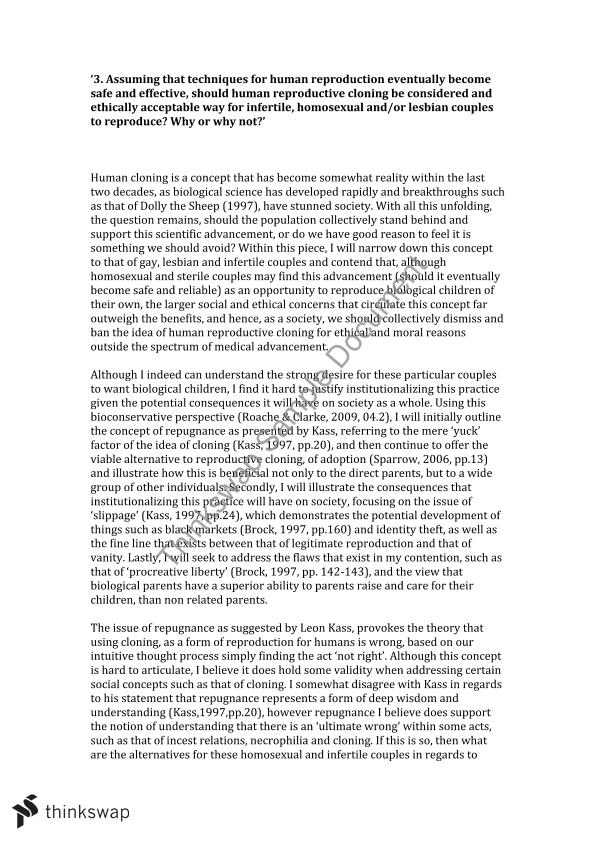
Send via email
The topic of human cloning inclusively brings up issues also raised in the mentioned technologies. Human cloning is of two types: therapeutic and reproductive. Therapeutic cloning aims to produce tissues or organs from cells of a cloned embryo, whereas reproductive cloning aims to further develop the cloned embryo into a human being (Glannon 89) Abstract Ethical evaluation in human cloning remains to be debatable since there hasn’t been adequate evidence to showcase that this scientific pursuit is dangerous. In most arguments presented by opposing policymakers and scientists, it is implied that human cloning is an impending disaster whose implications would affect humankind in the future "Human cloning" will refer to the application of somatic nuclear transfer technology to the creation of a human being that shares all its nuclear genes with the person donating the implanted nucleus (Ethics ). Scientists are proceeding ahead with research into the Works Cited: "Cloning Fact Sheet." (). Human Genome Project Information

IELTS Human Cloning Essay
Human cloning is not as simple as just replicating a person. There are various scientific and technological obstacles to performing this study. In terms of science, human cloning has its own benefits and problems, especially therapeutic cloning. One of the main advantages of using stem cells isolated from embryos is that the cells are pluripotent Many different types of human cloning procedures could provide various benefits to society, such as birth help for infertile couples, conservation of endangered species and a reduction of hereditary genetic diseases and outweigh moral arguments against the cloning process Human cloning may “provide infertile individuals and couples with children, and by making cloned cells, you might find a way to make tissues and organs to treat diseases” (Howe 23). From the scientific viewpoint, human cloning is a basis for regenerative medicine: cloned organs and tissues do not trigger any immune response, and as a result, they do not require taking

Contributors Bio
· Human cloning is a promising area in biotechnology that can be used alongside surrogacy and in vitro fertilization to create children which will possess superior traits and be immune to numerous serious diseases. Most of the arguments against it result from a lack of understanding of what actual cloning blogger.comted Reading Time: 7 mins Abstract Ethical evaluation in human cloning remains to be debatable since there hasn’t been adequate evidence to showcase that this scientific pursuit is dangerous. In most arguments presented by opposing policymakers and scientists, it is implied that human cloning is an impending disaster whose implications would affect humankind in the future Human cloning may “provide infertile individuals and couples with children, and by making cloned cells, you might find a way to make tissues and organs to treat diseases” (Howe 23). From the scientific viewpoint, human cloning is a basis for regenerative medicine: cloned organs and tissues do not trigger any immune response, and as a result, they do not require taking
NEED A CUSTOM PAPER?
· Human cloning is a promising area in biotechnology that can be used alongside surrogacy and in vitro fertilization to create children which will possess superior traits and be immune to numerous serious diseases. Most of the arguments against it result from a lack of understanding of what actual cloning blogger.comted Reading Time: 7 mins The topic of human cloning inclusively brings up issues also raised in the mentioned technologies. Human cloning is of two types: therapeutic and reproductive. Therapeutic cloning aims to produce tissues or organs from cells of a cloned embryo, whereas reproductive cloning aims to further develop the cloned embryo into a human being (Glannon 89) "Human cloning" will refer to the application of somatic nuclear transfer technology to the creation of a human being that shares all its nuclear genes with the person donating the implanted nucleus (Ethics ). Scientists are proceeding ahead with research into the Works Cited: "Cloning Fact Sheet." (). Human Genome Project Information
Recent Essays
Abstract Ethical evaluation in human cloning remains to be debatable since there hasn’t been adequate evidence to showcase that this scientific pursuit is dangerous. In most arguments presented by opposing policymakers and scientists, it is implied that human cloning is an impending disaster whose implications would affect humankind in the future Human cloning is not as simple as just replicating a person. There are various scientific and technological obstacles to performing this study. In terms of science, human cloning has its own benefits and problems, especially therapeutic cloning. One of the main advantages of using stem cells isolated from embryos is that the cells are pluripotent Human cloning may “provide infertile individuals and couples with children, and by making cloned cells, you might find a way to make tissues and organs to treat diseases” (Howe 23). From the scientific viewpoint, human cloning is a basis for regenerative medicine: cloned organs and tissues do not trigger any immune response, and as a result, they do not require taking
No comments:
Post a Comment